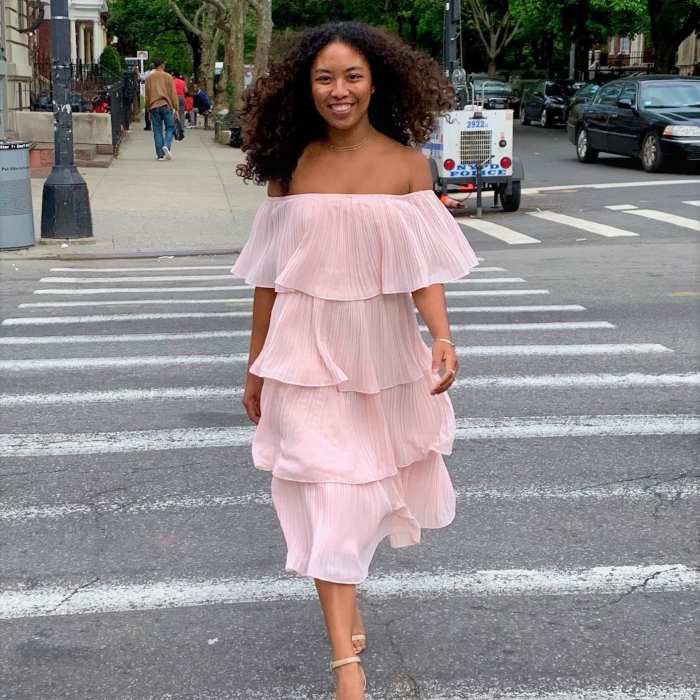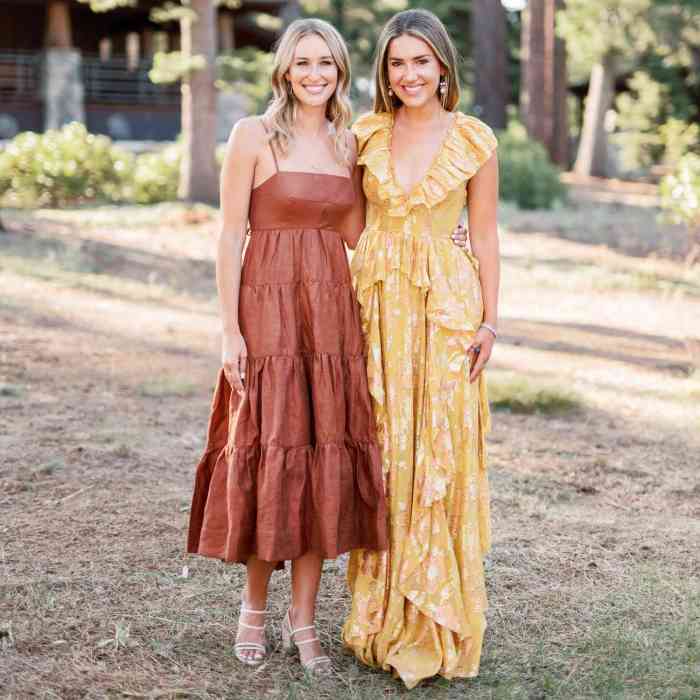Midi Dress Styles for Wedding Guests
Midi dress for wedding guest – Choosing the perfect midi dress for a wedding requires considering various factors, from the dress code to your personal style. This section explores different midi dress styles, their suitability for various wedding settings, and the impact of fabric choice.
Midi Dress Styles
Several midi dress styles are appropriate for wedding guests. The choice depends on personal preference, body type, and the wedding’s formality.
| Style | Silhouette | Neckline | Sleeves |
|---|---|---|---|
| A-line | Flowing, flattering on most body types | Round neck, V-neck, sweetheart | Sleeveless, short sleeves, three-quarter sleeves |
| Fit-and-flare | Fitted bodice, flared skirt | High neck, boat neck, halter | Long sleeves, cap sleeves, off-the-shoulder |
| Wrap dress | Adjustable fit, cinches at the waist | V-neck, scoop neck | Short sleeves, three-quarter sleeves, long sleeves |
| Shift dress | Straight, loose-fitting | Round neck, crew neck, V-neck | Sleeveless, short sleeves |
| Empire waist | Fitted bodice just below the bust, flowing skirt | Sweetheart, V-neck, off-the-shoulder | Sleeveless, short sleeves, cap sleeves |
Floral vs. Solid-Colored Midi Dresses
The choice between a floral and a solid-colored midi dress depends largely on the wedding’s style and formality.
- Formal weddings: Solid colors, particularly jewel tones or sophisticated neutrals, are generally more appropriate. A subtly patterned floral print might work, but avoid overly busy or bright designs.
- Informal weddings: Floral prints are often a great choice for informal weddings, allowing for more playful and vibrant designs. Solid colors also remain a safe and stylish option.
- Beach weddings: Light-colored floral prints or solid pastels often complement the relaxed atmosphere of a beach wedding. Lightweight fabrics like cotton or linen are ideal.
- Rustic weddings: Floral prints in muted tones or soft solid colors are suitable for rustic weddings. Consider fabrics like lace or cotton.
Impact of Fabric Choice
Fabric significantly impacts the overall look and feel of a midi dress. Different fabrics suit different seasons and levels of formality.
| Fabric | Suitability for Season | Formality Level |
|---|---|---|
| Silk | Spring/Summer (lighter weights), Fall/Winter (heavier weights) | Formal to semi-formal |
| Lace | Spring/Summer, Fall/Winter (depending on weight) | Semi-formal to formal |
| Chiffon | Spring/Summer | Semi-formal to informal |
| Cotton | Spring/Summer | Informal to semi-formal |
Accessorizing a Midi Dress for a Wedding: Midi Dress For Wedding Guest
Accessories can elevate a midi dress, making it appropriate for various wedding settings. Careful consideration of jewelry, shoes, and handbags is crucial.
Accessorizing Options
Option 1: Elegant and Classic: A simple yet elegant necklace (pearl or delicate gold chain), pointed-toe heels in a neutral color (nude or black), and a structured clutch in a coordinating color. This option is versatile and works well for most wedding settings.
Option 2: Bohemian Chic: Layered necklaces with natural stones or charms, ankle-strap sandals or wedges, and a straw or woven handbag. This option is perfect for a more relaxed wedding setting like a beach or garden wedding.
Option 3: Modern and Minimalist: Statement earrings (geometric or bold), block-heeled sandals or mules in a vibrant color, and a small crossbody bag. This option offers a contemporary and stylish look suitable for various wedding types.
Impact of Accessory Colors and Patterns
The colors and patterns of accessories significantly impact the overall look of the outfit. Careful selection ensures a cohesive and stylish appearance.
- Bold colors can create a statement, particularly with neutral-colored dresses.
- Matching colors can create a more unified and sophisticated look.
- Contrasting colors can add visual interest and personality.
- Printed accessories can add texture and pattern, especially with solid-colored dresses.
Adapting a Midi Dress for Different Dress Codes
| Dress Code | Dress Adjustments | Accessory Suggestions |
|---|---|---|
| Black-Tie | Choose a luxurious fabric like silk or velvet, opt for a more formal silhouette (e.g., fit-and-flare or A-line), consider long sleeves or elegant detailing. | Statement jewelry, elegant heels, clutch |
| Cocktail | A midi dress in a semi-formal fabric (e.g., lace or crepe) with a slightly more embellished design would be suitable. | Stylish heels, statement jewelry, clutch or small handbag |
| Casual | A flowy cotton or linen midi dress in a bright color or floral print is a good choice. | Flat sandals or wedges, minimal jewelry, crossbody bag |
Finding the Perfect Midi Dress
Finding a flattering midi dress involves considering body type, the wedding’s venue and theme, and avoiding potential pitfalls.
Tips for Finding a Flattering Midi Dress
The ideal midi dress depends on individual body type. Here are some tips based on common body shapes.
- Petite: Opt for dresses with vertical lines or detailing to elongate the figure. Avoid overly long or voluminous skirts.
- Curvy: Choose A-line or empire waist styles that accentuate the waist. Consider fabrics with structure to provide shape.
- Tall: You have more freedom in choosing styles. Consider maxi dresses or midi dresses with bold prints or details.
Factors to Consider When Choosing a Midi Dress, Midi dress for wedding guest
- Venue: The venue (church, garden, beach) influences the dress’s formality and fabric choice.
- Weather: Consider the season and temperature when choosing fabric and sleeve length.
- Wedding Theme: Select a dress that complements the wedding’s overall style and aesthetic.
Pitfalls to Avoid
- Clashing colors: Avoid colors that clash with the wedding’s color scheme or the bride’s dress.
- Inappropriate length: Ensure the midi length is appropriate for the venue and occasion.
- Overly casual styles: Avoid styles that are too informal for the wedding’s dress code.
Midi Dress Etiquette for Wedding Guests

Source: lulus.com
Appropriate attire demonstrates respect for the wedding couple and the event’s formality. This section provides guidelines on dress codes, color choices, and avoiding overshadowing the bride.
Considering the Wedding’s Dress Code

Source: brides.com
Always check the wedding invitation for a dress code. This provides guidance on the appropriate level of formality.
- Formal: Floor-length gowns or elegant midi dresses in rich fabrics are suitable.
- Semi-formal: Knee-length or midi dresses in sophisticated fabrics are appropriate.
- Casual: Sundresses or more relaxed midi dresses in lighter fabrics are acceptable.
Avoiding Overshadowing the Bride
The most important aspect of wedding guest attire is to avoid upstaging the bride. The following guidelines will help ensure your outfit is appropriate.
- Avoid white or ivory: These are traditionally reserved for the bride.
- Choose a less flashy design: Opt for a dress that is stylish but not overly attention-grabbing.
- Consider the overall look: The complete outfit (dress, shoes, accessories) should be harmonious and tasteful.
Appropriate Color Choices
Color choice depends on the season, wedding theme, and location.
| Season | Wedding Type | Suitable Colors |
|---|---|---|
| Spring | Formal | Pastel shades, floral prints |
| Summer | Beach | Light colors, bright colors, floral prints |
| Autumn | Rustic | Earthy tones, jewel tones |
| Winter | Formal | Darker colors, jewel tones, rich fabrics |
Key Questions Answered
Can I wear a black midi dress to a wedding?
Black can be appropriate, especially for evening weddings or those with a more formal dress code. However, consider the overall style and avoid anything too severe. Accessorizing with bright colors or interesting textures can help.
What length midi dress is most flattering?
A midi dress that hits just below the knee or at the calf is generally the most flattering length for most body types. Avoid anything too short or too long that might overwhelm your frame.
What if the wedding has a specific color theme?
If the wedding has a color theme, try to incorporate that color into your accessories rather than the dress itself. A subtle nod to the theme is sufficient and avoids clashing with the overall aesthetic.
